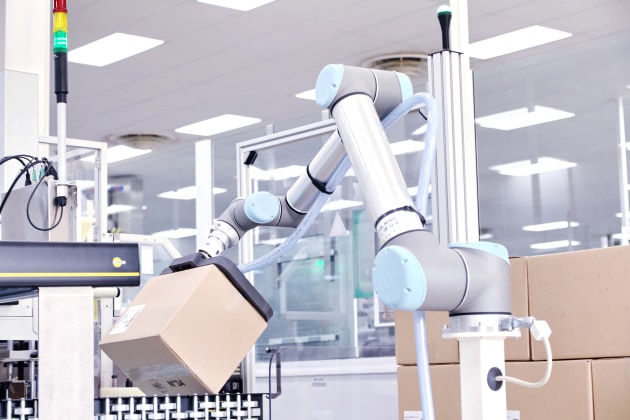Work-from-home policies and ongoing disruption have fast-tracked cloud-based technologies. Universal Robots has seen an increased uptake in Industry 4.0 to meet demand, manage uncertainty and improve productivity. This article was first published in Food & Drink Business March 2021.
The world has become increasingly connected. Almost 60 per cent of the entire world’s population and more than 90 per cent of the developed world is now online. It is hard to imagine life without the internet – no smartphone, online banking, streaming music or podcasts, Netflix, social media, or email.
Connecting humans through the internet has dramatically expanded our individual reach, our capacity to sell globally and our ability to help others wherever they are. Particularly in a post-COVID-19 world, where this may be our only way to connect with those around us.
Manufacturers operating in both the consumer and business worlds are bringing out new technologies to the meet ever-changing needs of their customers. In Australia’s manufacturing sector for instance, we are seeing a notable uptick in Industry 4.0 technologies, largely due to disruptions caused by recurring lockdowns and the need for ongoing productivity.
Through cloud-based technologies, manufacturers can connect their equipment and their processes on the shop floor, without the need for on-the-ground support. Benefits include real-time analytics, predictive maintenance, online support and diagnostics, cloud backups, and more.
Further to this, robots and collaborative robots (cobots) are getting a lot of attention these days as the answer to social distancing and ongoing productivity in the workplace. Their ability to be programmed and used remotely is also in high demand.
Cloud Robotics
A recent Deloitte report cited the rise of automation in the manufacturing sector. It states that in 2018, humans carried out 71 percent of tasks, but this is forecast to drop to 58 percent by 2022. The report also found that although 75 million jobs will be eliminated, 133 million new jobs will be created.
On ‘local shores’, Robotics Australia Group recently ran a request to creators of robotics and robotic technology to complete an Australian Government’s survey on artificial intelligence (AI) and autonomous systems capability. Once completed, the map will be shared with Australia’s digital economy and technology ministers and agencies, to highlight areas of strength and expertise. Its goal is to drive greater collaboration domestically and promote Australia as a key location for research, development and commercialisation.

So, where does cloud robotics come into play and how will it serve Australia and NewZealand? Universal Robots Asia-Pacific regional director James McKew says cloud robotics is an emerging field which makes use of cloud-based technologies such as cloud computing, cloud storage and other technologies to remotely use, service and program robots.
“The workplace of the future is now. With the need for social distancing and staff safety of the utmost concern, productivity is at stake and this is where cobots and in particular ‘connected cobots’ come in. In ever-changing and disruptive times, they’re set to become your biggest competitive advantage,” McKew says.
A Connected World and Cobots
Universal Robots has partnered with its OEM, Hirebotics, to make cloud tools freely available for all its cobots. Hirebotics has cloud connected their cobots for many years and recently released some of their capabilities for free to the Universal Robots ecosystem.
McKew says that there are numerous benefits across three primary categories in connecting cobots to the cloud.
1. Analytics: “Simply put, analytics are used to answer two questions: ‘what happened’ and ‘what is going to happen’? The former makes use of machine data to better understand historical production data, cycle time variations, and downtime. The latter makes use of sophisticated software that leverages machine learning to gain a deeper understanding of a particular application,” says McKew.
These insights help to build predictive models based on trends.
2. Backups: Cobots are just as dynamic as the production environment itself. “Over time, changes need to be made to a cobot program to accommodate new part numbers or changes in the environment. Rather than relying on manual backups, manufacturers can now back a cobot up on the cloud,” continues McKew. “This provides peace-of-mind and new capabilities. Furthermore, cloud backups can be completed in real-time”.
3. Support: “A cloud-connected cobot is easy to support. If you’re struggling with an application or are running into issues, you can easily share analytics, logs, the I/O status and other data with your distributor, integrator or support contact,” McKew says. He adds that the biggest saving here is time. Rather than waiting for someone to come out, support can be carried out remotely. “While some traditional industrial robots still require pricy add-ons or modules to help analyse data, cobots are equipped with an ethernet port on their controller”.
Troubleshooting
The benefits of cloud connecting robots are clear, but what holds companies back? Cost, complexity, and security fears are key customer concerns.
“However, there are solutions to avoid both cost and complexity. Our cloud software runs natively on a cobot’s controller and there is no need for external hardware. Your cobot can be registered by simply scanning a QR code using a mobile app and this platform comes at no added cost,” McKew says.
Security is always of concern when making use of a cloud connected device and it is recommended using a firewall to allow only trusted traffic.
The benefits of cloud connecting robots on ‘local shores’ are clear. Companies that exploit these capabilities will have a competitive advantage over companies that don’t, particularly in the current stay-at-home environment.





